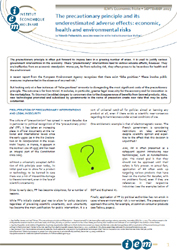The precautionary principle and its underestimated adverse effects: economic, health and environmental risks
Economic Note

The precautionary principle is often put forward to impose bans in a growing number of areas. It is used to justify various government interventions in the economy. These « precautionary » interventions lead to various adverse effects, however. They are ineffective from an economic standpoint. Worse yet, far from reducing risk, they often prove to be hazardous for health and the environment.
A recent report from the European Environment Agency recognizes that there exist « false positives. » These involve public measures implemented in the absence of any real risk.
But looking only at a few instances of « false positives » amounts to disregarding the most significant costs of the precautionary principle. The outcome is far from trivial. It includes, in particular, greater legal insecurity for the economy and for innovation in the marketplace. To this must be added dangers to consumers due to the disappearance of benefits from banned products. Also, new technologies promoted and subsidized by governments in the name of precaution create new risks that may be quite substantial.






